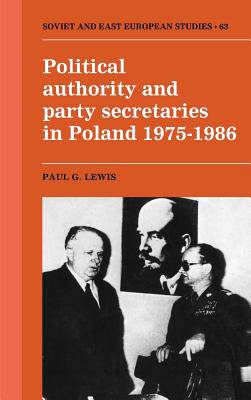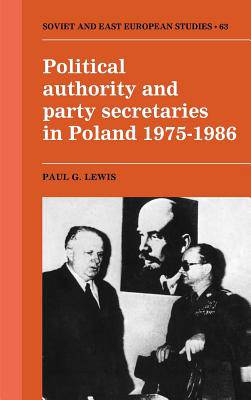
Bedankt voor het vertrouwen het afgelopen jaar! Om jou te bedanken bieden we GRATIS verzending (in België) aan op alles gedurende de hele maand januari.
- Afhalen na 1 uur in een winkel met voorraad
- Gratis thuislevering in België vanaf € 30
- Ruim aanbod met 7 miljoen producten
Bedankt voor het vertrouwen het afgelopen jaar! Om jou te bedanken bieden we GRATIS verzending (in België) aan op alles gedurende de hele maand januari.
- Afhalen na 1 uur in een winkel met voorraad
- Gratis thuislevering in België vanaf € 30
- Ruim aanbod met 7 miljoen producten
Zoeken
Political Authority and Party Secretaries in Poland, 1975 1986
Paul G Lewis
€ 209,45
+ 418 punten
Uitvoering
Omschrijving
Paying particularly close attention to the provisional party organization and to the party secretaries who direct its activities, this book examines the changing position and role of the Polish United Workers' Party and its apparatus between 1975 and 1986. The role of the party secretaries and the way they perform is seen as a major determinant of the nature of party leadership and of the strength of political authority in communist states. The author argues that the protracted crisis of the Polish system reflects less the weakness of communist party power than critical problems encountered in accumulating and exercising authority. The crisis of 1980 was as much due to inadequate political strategies as to the economic failings of the Gierek regime.
Specificaties
Betrokkenen
- Auteur(s):
- Uitgeverij:
Inhoud
- Aantal bladzijden:
- 368
- Taal:
- Engels
- Reeks:
- Reeksnummer:
- nr. 63
Eigenschappen
- Productcode (EAN):
- 9780521363693
- Verschijningsdatum:
- 8/06/1989
- Uitvoering:
- Hardcover
- Formaat:
- Genaaid
- Afmetingen:
- 152 mm x 229 mm
- Gewicht:
- 707 g

Alleen bij Standaard Boekhandel
+ 418 punten op je klantenkaart van Standaard Boekhandel
Beoordelingen
We publiceren alleen reviews die voldoen aan de voorwaarden voor reviews. Bekijk onze voorwaarden voor reviews.









